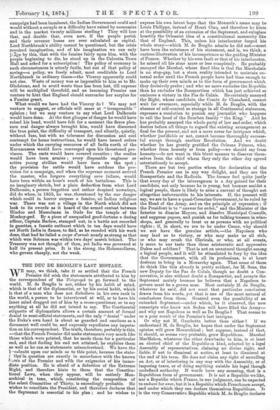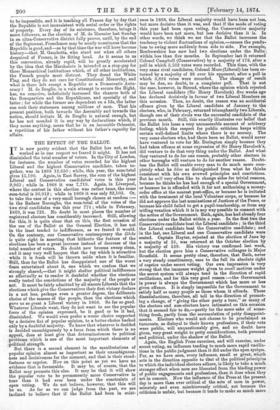THE DUO DE BROGLIE'S LAST MISTAKE.
WE may, we think, take it as settled that the French Premier did wish the statements attributed to him by the correspondent of the Telegraph to go forward to the world. M. de Broglie is not, either by his habit of mind, which is that of the diplomatist, or by his social habit, which is that of a man who does not disbelieve in his own rank in the world, a person to be interviewed at will, or to have his inner mind dragged out of him by a cross-questioner, or to say anything at all he did not intend to say. The Continental etiquette of diplomatists allows a certain amount of formal denial to semi-official statements, and the only " denial " under the Duke's own hand is about as guarded and cautious as a document well could be, and expressly repudiates any imputa- tion on his correspondent. The truth, therefore, probably is this, —that the French Premier did make statements very much like those which were printed, that he made them for a particular end, and that finding his end not attained, he explains them as well as he can as statements misunderstood. We have the
-0aloubt upon our minds as to this point, because the state- tilos in question are exactly in accordance with the known _ma of the Premier and with the exigencies of his imme- diate position. He is afraid of a defection of the Extreme Right, and therefore hints to them that the Constitu- tional Laws, when they appear, will be entirely Mon- archical in tone, which, considering the composition of the select Committee of Thirty, is exceedingly probable. He wishes to conciliate the President, and therefore declares that the Septennat is essential to his plan ; and he wishes to
express his own latent hope that the Monarch's name may be Louis Philippe, instead of Henri Cinq, and therefore he hints at the possibility of an extension of the Septennat, and eulogises heartily the Orleanist idea of a constitutional monarchy like that of England. This, unless his interlocutor forged his whole story—which M. de Broglie admits he did not—must have been the substance of his statement, and is, we think, a curious illustration of his incompetence as the guiding Minister of France. Whether by his own fault or that of his interlocutor, he missed all his aims more or less completely. He probably annoyed the Marshal, whose fixed idea is that the Marshalate is no stop-gap, but a stern reality intended to maintain ex- ternal order until the French people have had time enough to make up their own minds as to the form of government which they decisively prefer ; and who no more excludes the Republic than he excludes the Bonapartism which has just achieved so ominous a victory in the Pas de Calais. He certainly annoyed the Right, whose candidate, the Comte de Chambord, cannot wait for evermore, especially while M. de Broglie, with the absence of self-control so strange in all Continental statesmen, expresses a resolution to punish any journalist who happens to call the head of the Bourbon family "the King." And he has probably annoyed the whole party of law and order, which desires before all things to regard the existing arrangement as final for the present, and not a mere cover for intrigues which, whether justifiable or not, cannot become thoroughly success- ful except through another Revolution. And we doubt whether he has greatly gratified the Orleans Princes, who, whether from honesty or from policy—we should say from honesty—do not want in this blunt manner to dissever them- selves from the chief whom they only the other day agreed ostentatiously to accept.
There are but two parties whom the declaration of the French Premier can in any way delight, and they are the Bonapartists and the Radicals. The former feel quite justly that every day of the interregnum is a day gained for their candidate, not only because he is young, but because amidst a logical people, there is likely to arise a current of thought not altogether unfavourable to his interests. If, the peasant will say, we are to have a quasi-Caasarian Government, to be ruled by the Head of the Army, and on the principle of repression ; if the President is to "answer for order," and the Minister of the Interior to dismiss Mayors, and dissolve Municipal Councils, and suppress papers, and punish us for talking treason in wine- shops, and generally to treat us as persons with no political rights ; if, in short, we are to be under Cmsar, why should we not have the genuine article,—the Napoleon who may lead us to victory, or who may make us all rich, or who may crush the Clericals, or who, at all events, is more to our taste than these aristocratic and oppressive Dukes and soldiers? That is not an unnatural thought among a logical people, and it will be stimulated to fury by the idea that the Government, with all its professions, is at heart desirous to bring in a Monarchy again. That some of them do think like this already is pretty evident, for M. Sens, the new Deputy for the Pas de Calais, though no doubt a Con- servative, is also without doubt a Bonapartist, and accepts the Septennat mainly because he believes that a Napoleon to govern must be a grown man. Most certainly M. de Broglie, whatever he said, did not want that particular conclusion drawn from his words, yet that is one of the most natural of conclusions from them. Granted even the possibility of an extended Septennat—under which, be it observed, the new conscripts who know not Sedan will have filled the Army— and why not Napoleon as well as De Broglie That seems to us a poor result of the Premier's last intrigue.
Or why not M. Gambetta better than either ? If we understand M. de Broglie, he hopes that under the Septennat opinion will grow Monarchical ; but suppose, instead of that, it should, as seems very probable, grow Republican. Marshal MacMahon, whatever the other drawbacks to him, is at least an elected chief of the Republic in kind, selected by a legal Assembly of representatives, claiming no divine right, and liable, if not to dismissal at notice, at least to dismissal at the end of his term. He does not claim any right of annulling an Act, or of interfering in any way with the Assembly, or of imposing taxes, or of doing anything outside his legal though undefined authoiity. If words have any meaning, that is a Republican form of government. It is not a Republic we like, nor a Republic which France, in our judgment, can be expected to endure for ever, but it is a Republic which Frenchmen accept, and under which they can declare themselves Republican. It is the very Conservative Republic which M. de Broglie declares to be impossible, and it is teaching all France day by day that the Republic is not inconsistent with social order or the rights of property. Every day of its existence, therefore, brings it more followers, as the election of M. de Marmier last Sunday in an ultra-Conservative district fully proves, until, by the end of the Septennat, Frenchmen may be nearly unanimous that the Republic is good, and—as by that time the war will have become history—that M. Gambetta, who stood out when all others despaired of France, is its fitting head. As it seems to us this conversion, already rapid, will be greatly accelerated by the idea that the Marshalate is intended as a stop-gap for those Monarchical institutions which, of all other institutions, the French people most distrust. They dread the White Flag, and they do not care for Constitutional Monarchy, and what is there left except a Republic or a Democratic Auto- cracy? M. de Broglie, in a vain attempt to secure the Right, has, we conceive, indefinitely increased the chances both of the Bonapartists and the Republicans, and specially of the latter ; for while the former are dependent on a life, the latter can seek their statesmen among millions of men. That his present position, both towards the Assembly and towards the nation, should irritate M. de Broglie is natural enough, but he has not mended it in any way by declarations which, if they mean anything, mean that he is an incurable Orleanist, a repetition of his father without his father's capacity for affairs.



































 Previous page
Previous page